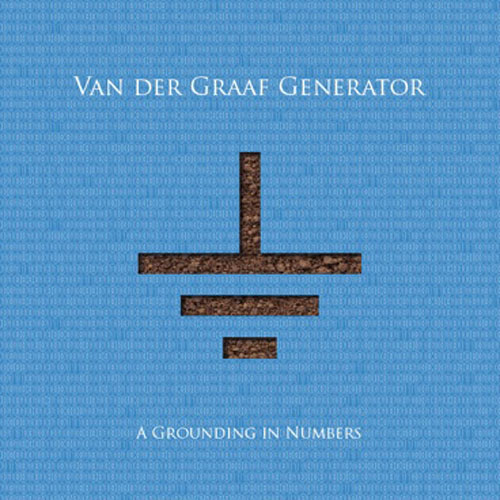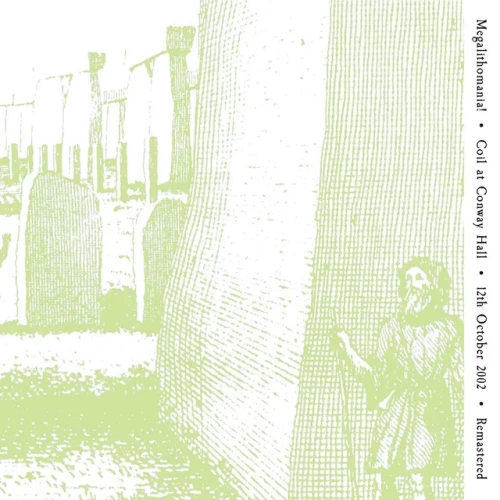 Six years after their surprise reunion, it still seems unreal to be listening to a new Van der Graaf Generator record. Stranger still, lowering the stylus onto A Grounding in Numbers instills the same rush of anticipation as when I ran round to David Hilton’s house back in April 1976 with the newly released Still Life because he had the nearest available record player to County Records.
Six years after their surprise reunion, it still seems unreal to be listening to a new Van der Graaf Generator record. Stranger still, lowering the stylus onto A Grounding in Numbers instills the same rush of anticipation as when I ran round to David Hilton’s house back in April 1976 with the newly released Still Life because he had the nearest available record player to County Records.
But anyway, thirty-five years on, can anyone reasonably expect a masterpiece from three sexagenarians taking a break from their day jobs every couple of years to spend a week or so recording in a West Country hideaway? Of course not… that would be quite unreasonable.
And yet you never know…
On first listen, A Grounding in Numbers is indeed a bit disappointing, but then every VdGG record has been underwhelming on first hearing – they are by nature not an instant hit. Back in the seventies, when an LP cost several weeks’ pocket money, we would spin awkward records over and over again to try to get into them and justify our outlay. More often than not the process just confirmed our poor judgement, but occasionally – with groups like Henry Cow, Faust and yes, Van der Graaf Generator, it would bear rich fruit, opening up wonderful new worlds that we still inhabit decades later but would never had discovered without that effort.So… fifteen plays later, how does the record stand up?
Opening song “Your Time Starts Now” is a wistful meditation on the passing of time, much like those that have filled Peter Hammill’s last 98 solo records, and tantalizingly provides a glimpse into just how great all those records would have been had he invited Messrs. Banton and Evans along to help out. An unequalled songwriter, Hammill’s choice of timbre and rhythm has never been a strong point – something his two current colleagues are happy and capable to compensate for. A good start.
Second song “Mathematics” starts off in similar fashion, but then the chorus kicks in with Hammill’s stentorian tones bellowing out “e to the power of i times pi plus one is zero, e to the power of i times pi is minus one” as if it were the most natural hook for a pop song ever, and we are reminded that this is a group that does things differently. Despite being voted “greatest equation ever” by readers of Physics World magazine back in 2004, and “most beautiful theorem in mathematics” by readers of The Mathematical Intelligencer magazine in 1990, this may well be the first appearance of Euler’s Identity in popular song – this is indeed what we want! Unfortunately, we will have to wait till almost the end of the second side for another example of such lyrical inspiration, in the similarly mathematical “5533.”Back down to earth for “Highly Strung” – one of those ‘geeks can rock too’ tracks that filled up Hammill’s justly unloved 1992 album The Noise. To be fair, the verses have a wonderfully unhinged momentum to them, but it’s totally dissipated by the rolled-up suit sleeves 80s style chorus… urgh! “Bunshō” sees Hammill addressing the artist’s inability to judge their own work, concluding that “No-one can ever know what of their own’s their very best”. Well if it’s any help Peter… this one isn’t. The following track “Snake Oil” is far more like it, urgently careering round as many breakneck time change convolutions in its five minutes than most groups manage in a twenty minute prog epic and bringing side one to breath-taking and sudden climax.
Flipping the record over, side two opens with “Splink,” an instrumental inspired by a 70s TV road safety public information film. Considering that both Present and Trisector were marred by superfluous instrumentals, it comes as quite a surprise that “Splink” is actually an album highlight. Slow and brooding, with dissonant electronics bubbling behind oblivious harpsichord, slide guitar and abstract drum patterns, its mere two and a half minutes display this new concise approach at its most rewarding and could very well point the way for an interesting future sonic approach for the group. “Embarrassing Kid” is another thrilling math-punk workout, somewhat let down, as is much of the album, by lyrics that are well… embarrassing. Since VdGG started releasing new material back in 2005, it has seemed as if Hammill has bizarrely seen the group as an outlet for throwaway hastily dashed off lyrics, keeping the good stuff for himself. It’s not as if he’s lost the ability to write – his solo albums Singularity and Thin Air contain some outstanding work written in the same period. How wonderful would it be to marry the considered writing of these albums to the breath-taking musical interplay and superior sonic palette of the current VdGG trio?Anyway, things improve once more and the remainder of side two provides an inspired climax to a great, if flawed album. As for my initial worries, the short tracks are skillfully sequenced to flow together and had they been indexed with Roman rather than Arabic numerals, the album would probably be considered a magnum opus in the tradition of A Plague of Lighthouse Keepers or at least Incoherence. Even the presence of Hugh Padgham fails to dampen proceedings – the man has clearly been to a couple of record-production night classes since the eighties and actually brings a sparkling clarity to the recordings that was missing from the group’s previous two self produced albums – not a trace of gated reverb to be heard anywhere!
Approaching this record expecting another Still Life, or even another Trisector is as pointless as expecting Godbluff to be another Pawn Hearts was back in 1975. The whole reason that Van der Graaf Generator can instill such devotion is that they never repeat themselves – they are perhaps, despite their disdain of the word, the only truly ‘progressive’ group to actually emerge from that maligned genre.
A Grounding in Numbers is not Van der Graaf Generator’s best record by a long way but it’s a wonderful album by any reasonable standards, and it most certainly doesn’t rest on the group’s laurels. For that reason alone, it must be judged a major success; musically, the trio gel into an exciting and intuitive unit that surpasses the efforts of most groups a third of their age. Banton and Evans consistently give 100% throughout the album, and indeed Hammill is technically in superb voice. If only he would give the group some of his grade-A lyrics rather than just the “hack work, just dashed off, packed full of prolix puff and sad cliché…” that he grudgingly parts with here, we may yet see a VdGG album to top even their youthful classics. As it is, A Grounding in Numbers is more than we could have expected or hoped for.
-Alan Holmes-




7 thoughts on “Van der Graaf Generator – A Grounding in Numbers”
Hugh Padgham has produced XTC’s English Settlement, The Police’s Synchronicity, some Phil Collins, some other Genesis (and I am sure I forget some more) and they are some of the best produced records of the ’80s. I really don’t know what you are on about with Hugh Padgham.
What’s the problem with “gated reverb”? It’s one way to treat sound and obviously Hugh used it when it was right to do so.
Note that I have no connection with him but I resent you slagging him off for no reason. And oh by the way… this VdGG album is very very good and I didn’t need to listen to it 15 times to find out!
Yeah mate, i’m just writing after only one listen and though i agree with you in some points ”A grounding..” it’s not another ”Still life” of course it’s in another direction musically speaking but seems to me way better than ”Trisector” more interesting i would say…too soon?…maybe but still i’m touched by their music.
Cheers
“…Hugh Padgham, a man responsible for many of the nastiest atrocities of the eighties…”
Atrocities ??!! Oh please. Learn something. While you don’t, stop writing reviews leading people to wrong directions.
“…dated King Crimson (80s version) style sleeve artwork…”
Time passes man….70’s Roger Dean’s album covers are also date… but exceptional (to say the least). It seems that you are nailed to the past.
Something wrong to “… be nailed to the past?” The best, magnum opus in music, art in general, paint, literature etc. is 2-3 century old! I want the best to listen to, to watch to, and if the best music composers and performers are dead 200 years ago I listen to that! Who cares the modernism at any cost? Problems with nostalgia?
Are you scared “living in the past”? I travel by plane. I have a full comfort house. I have a very fast ADSL and share a lot. But when I need immortal music I pick my Mozart, Stravinskij, Vivaldi, “old” KC, “old” VDGG etc. stuff. Artists can do as they want but I’m not obliged to say always: “Yes, Sir!” to their new inspiration.
When METALLICA changed in 1995 and tried to be “other” declared: “We Metal? Noooo! We’ve never been Metal”. And started dressing casual, short hair, country ballads etc. But I listen to John Denver if I need country. When many people abandoned ’em they realized: “Let’s do what we know and play better!” But 80’s Thrash times are impossible to repeat and they play “harder than ever” the same old songs for what they were masters and people want that and so it’s right.
I’m wondering every day when a new VDGG or KC or PF or GENESIS or HIGH TIDE or… will rise. Prog is dead? Oh, pity!
People complain that PROG tended to “2 side lenght-self indulgence-suite cliches-fairies-Merlin coats etc.” but who dares to say that PUNK must evolve from the “2 minute songs-no technics-cut your wrist-split to the crowd-anti system lyrics-all can/must play-I hate PINK FLOYD etc.” formula?
And yes, the cover is one of the most horrible, frozen cover ever made.
Long live Roger Dean, Whitehead, Keef and the HIPGNOSIS.
The same difference between Caravaggio and the …”murales”!
Years ago I even didn’t know how to “start a PC button”.
One day did something with PAINT elementary programme: lines, strange spots all mingled with the “free-wheeling mouse”, with no idea of what could come from.
Then I showed the result on paper to a painter-photographer, by joke assuming that I’ve picked from a modern drawnings collection and he said: “Uhmmm, fine work… this suggests this, that reminds that… but who’s this good artist?!!!!!”
I’ll buy the new VDGG (minus Jackson… 33% of the chemistry), listen to 2-3 times, put in the shelf and pick “H to He…” and… oohhh, I came!
Thanks much, Mr. Holmes and Freqzine, for a considered review. Is it apropos for me to write when I haven’t heard the CD yet (joking), since it arrives on these shores (USA) this Tuesday? Can’t wait. Don’t know that Peter Hammill’s song lyrics bothered me all that much on PRESENT and TRISECTOR, given how he’d chosen to begin simplifying on 1976’s WORLD RECORD. These may well continue on in that direction (and I will know when I’ve read them!), from the sound of things.
I have noticed how when a lot of bands reform they put out fine enough material but yes, as Dr. G above notes, one does put the new CDs away and go back to the old releases. Oddly, I haven’t stopped wearing out PRESENT and TRISECTOR; can’t tell you I listen to them as often as THE LEAST WE CAN DO, but no, they aren’t out of the hot pile even yet. Longevity is reassuring, but as Baron de Chamfort says, ‘No people is served by a reign that goes on too long.” The lads still kick ass live (as I saw on 6-21-09 in NYC), however, so De Chamfort’s law doesn’t apply to them. Long may they rev.
well, i came into van der graaf late in life. being a musician myself, im enthralled with them…i seen and meet them on the trisector tour.. they were wonderful…so much sound for 3 guys! yes, i still love the earlier stuff, but songs like “every bloody emporer”, and “nutter alert” are as good as anything before it…i was kinda broken hearted, when david jackson left…they were brave and moved on…” lets see if this works”.too me. its working and im thankful for every release they do… theres nobody else like them. dont think about it, act like its 1972 and were listening to them on acid..just enjoy!!!!
Nice to read a review with some depth to it: thanks for that. Ought to mention, at least, that Mr Padgham mixed rather than produced the album – so whilst I think you can attribute a certain level of sparkliness to him, it remains a ‘self-prduced’ album just like the previous two. I can’t believe I hadn’t noticed the sleeve’s similarity to Fripp/Belew/Levin/Bruford era KC – and an apposite point, as I think occasionally there is a similarity of intent and sound.